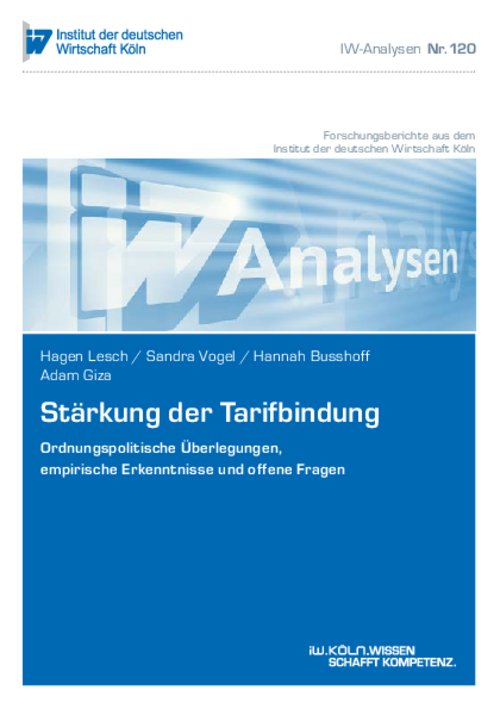Declining collective bargaining coverage in Germany has prompted a debate on how the trend could be reversed. However, this debate makes no distinction between the coverage and the autonomy of collective bargaining.

Expanding collective bargaining coverage
IW-Analyse

Declining collective bargaining coverage in Germany has prompted a debate on how the trend could be reversed. However, this debate makes no distinction between the coverage and the autonomy of collective bargaining.
The general assumption is that increasing coverage will automatically reinforce the right of employer and employee representatives to negotiate without government interference. Yet since this argument ignores the negative freedom of association – the right not to associate – it makes neither legal nor economic sense. It is competition from outsiders that ensures the appropriateness of a collective agreement, making the positive and negative freedoms of association equally necessary. Moreover, it is impossible to determine the optimal degree of collective bargaining coverage either theoretically or empirically. Although empirical research has identified various characteristics that influence the likelihood of an establishment choosing to be bound by collective agreements, these are mainly structural factors such as how a company is organised or the extent of its export business. The actual motives have not yet been sufficiently investigated. Policymakers would therefore be well advised to refrain from interfering with the autonomy of collective bargaining, and particularly from attempts to force companies into collective agreements. At the same time, the two sides of industry must face up to the need to expand their memberships and convince their members of the benefits of the German collective bargaining system.

Hagen Lesch / Sandra Vogel / Hannah Busshoff Adam Giza: Expanding collective bargaining coverage
IW-Analyse

Hagen Lesch / Sandra Vogel / Hannah Busshoff Adam Giza: Expanding collective bargaining coverage
IW-Analyse
More on the topic

Forms of Employee Participation and Conflict Management in the Workplace
An analysis based on the IW Personnel Panel showed which topics of conflict emerged in the workplace and how these conflicts were resolved. According to this data from 2022 works councils were present in 11 per cent of all companies.
IW
Works Council Elections 2022: Results of the IW Works Council Election Survey
Works councils receive strong backing from the workforces they represent. Nevertheless, the drop in turnout reported in the IW Works Council Election Survey 2022 suggests that this support is declining.
IW